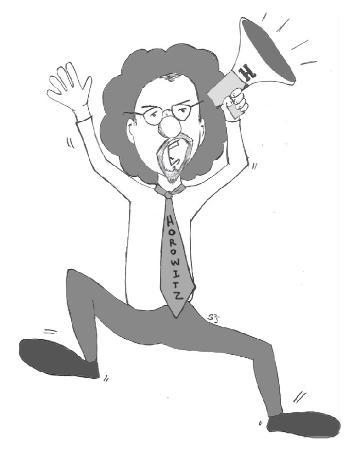
News
Summers Will Not Finish Semester of Teaching as Harvard Investigates Epstein Ties

News
Harvard College Students Report Favoring Divestment from Israel in HUA Survey

News
‘He Should Resign’: Harvard Undergrads Take Hard Line Against Summers Over Epstein Scandal

News
Harvard To Launch New Investigation Into Epstein’s Ties to Summers, Other University Affiliates

News
Harvard Students To Vote on Divestment From Israel in Inaugural HUA Election Survey
'Screwed Up' Students

Against my better judgment, I went to listen to the conservative pundit David Horowitz speak last Thursday in the Science Center. For the most part, it was everything I expected it would be—Horowitz spilling his reactionary ideas backed by historical half-truths. But the most upsetting thing was the support that students in the audience showed for him. When Horowitz was bold enough to claim that certain countries were plagued by “screwed up cultures,” Harvard students were disrespectful enough to clap and cheer. That students at this premier University would be so ready to accept other cultures as “screwed up” is alarming. Although there are legitimate problems in every culture (including our own), we should discuss them intelligently without recourse to inflammatory language. At a place like Harvard, where we expect our community to be full of well-informed morally competent individuals, it is amazing that this kind of disrespect for other cultures could take place.
In addition, whether one supports reparations for descendants of African-American slaves or not, those who comment on the issue should be held to certain standards of reasoning. Horowitz does not meet any reasonable standard; he repeatedly uses historical half-truths to support his claims and uses unbelievable statistics whose source he does not cite. Horowitz claims that African-Americans should be thankful because they have benefited from slavery. Does this claim make any sense? Should African-Americans actually be thankful that they live in a wealthy country despite the reality that much of that wealth was created by subjugating their ancestors? It is silly to say that blacks be thankful even though much of that wealth is not theirs.
Horowitz also claims that reparations have already been given in the form of welfare payments, affirmative action and the laws enshrining civil rights. This claim is inaccurate for many reasons. It assumes that the welfare system (which is dependent on income and family situation, not race) was put into place for African-Americans to correct the social problems put in place by slavery. On the contrary, most recipients of welfare in this country are white and the largest group that benefits from affirmative action is white women. Also, his claim that the civil rights laws are a form of reparations is ludicrous. Since when did such things as voting rights and desegregation qualify as reparations and not basic citizens’ rights?
Horowitz continually highlights certain aspects of history while ignoring others. Horowitz said that blacks in America enjoy the “greatest freedoms and most thoroughly protected individual rights” and yet he never addresses such things as the clearly unbalanced judicial system or racial profiling. Horowitz also complains that blacks in America should “move on” since slavery ended over a century ago. It must not occur to Horowitz that blacks received civil rights only in his lifetime.
The most incredible claim came when Horowitz asserted that blacks should be most thankful for the “gift” of freedom bestowed on them by the beloved United States. Stating that blacks would still be slaves if it were not for the efforts of white Americans, he argues that America led the world in abolishing slavery. I guess he simply forgot about the fact that Great Britain abolished slavery first.
These are only a small sample of Horowitz’s outrageous ideas; many more can be found in his overpriced books. I already knew on Thursday that Horowitz would present half-baked arguments, but I had no idea that Harvard students would actually be there supporting him. Why should students show respect to a man who is disrespectful not only by calling our peers “screwed up” but also by making patently silly—and often offensive—arguments? Horowitz has a right to say what he wants, but I just wish more people were intelligent enough to see through his empty words.
Margaret C. Anadu ’03 is a computer science concentrator in Cabot House.
Want to keep up with breaking news? Subscribe to our email newsletter.
